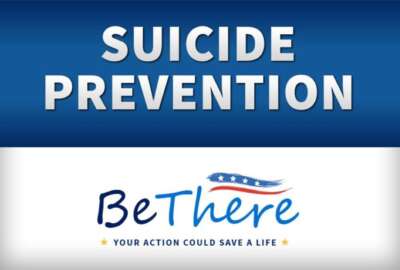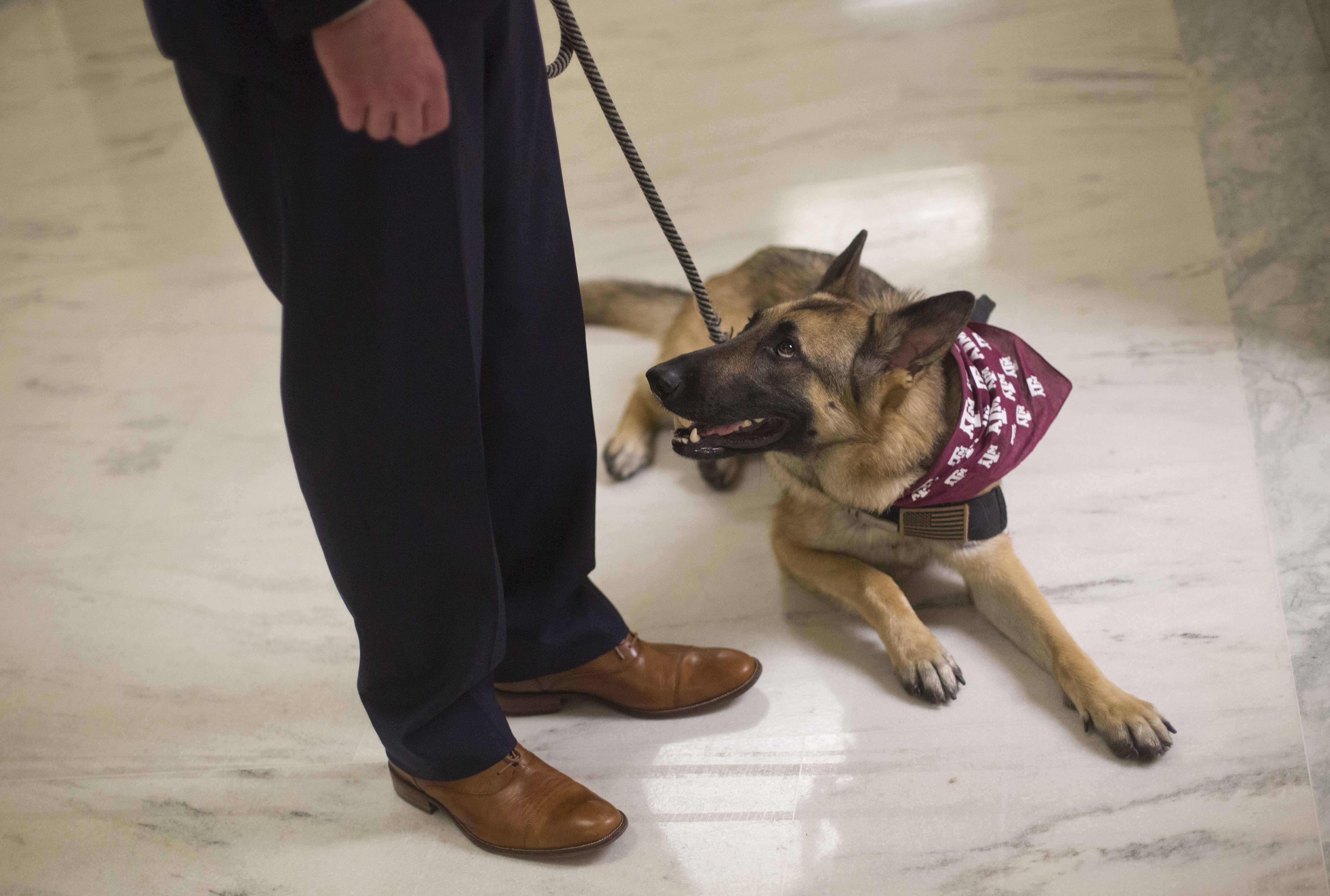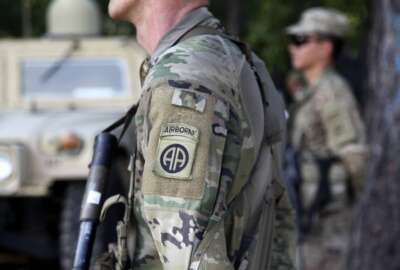In suicide prevention month, let’s not forget the four-legged friends
September is suicide prevention month, with lots of prevention information coming out of places like the Substance Abuse and Mental Health Services Administration.
September is suicide prevention month, with lots of prevention information coming out of places like the Substance Abuse and Mental Health Services Administration. A year in, the federally-backed 988 suicide prevention line has received millions of calls. But now we take a moment to celebrate how service dogs can help with the persistent problem of veteran suicide. For details, Federal Drive with Tom Temin talked with Cole Lyle, the Executive Director of the Veterans Advocate group called, “Mission Role Call.”
Interview Transcript:
Tom Temin And dogs. How do they actually help? I mean, service dogs are known to be good psychological. Any dog is a good psychological lift for anybody. But can they go so far as to help with suicide prevention?
Cole Lyle 100%. You know, I had my own dog. Her name was Kaya, and I got her after I had tried traditional evidence based treatments, pills and therapy from the VA that just exacerbated my symptoms. And dogs can help reduce symptoms of post-traumatic stress, but they can be an important backstop to suicide. Because when you get to that point and you’re really in crisis, you think I’m totally alone and I don’t have anybody that loves me or would miss me. And the dog is sitting there and you look at the dog and say, you know, I can’t leave the dog. The dog would miss me. And on top of that, you know, they provide a sense of purpose that pills and therapy just frankly, won’t ever do.
Tom Temin But yet people commit suicide and veterans among them, you know, we still have that persistent 22 a day or so. They have wives and children very often that they are leaving behind. So what’s the difference between a dog, do you think?
Cole Lyle Well, you know, somebody once said that dogs and infants are the only two things on earth that can experience and express true love. And part of why somebody gets to the point of crisis might be family. It might be relationship problems or divorce. It might be a custody battle with kids. It might be any number of different things. I mean, humans can add levels of stress even if you are very, very close to them. And dogs, you know, the worst they’re going to do is maybe have an accident on the floor. And specifically when it’s a train service dog, that is highly unlikely, number one. But number two, they are trained to do things. Like Kaya was trained to wake me up from nightmares, to stop anxiety attacks through what’s called the animal assisted intervention. So I think there’s a difference. Right. And I think anybody that has ever owned a dog will tell you that they can be therapeutic. But, you know, somebody with a specially trained service dog that’s trained to do work tasks specifically for psychiatric reasons can be exponentially more powerful.
Tom Temin Interesting. Yeah. They say family can inflict wounds worse than your worst enemy could ever dream of. I suppose that’s what Clarence Darrow used to say. The late lawyer. And the Paws Act helped expedite the supplying of the right kind of trained dogs to veterans. That’s been in effect since 2018. And has that helped?
Cole Lyle Well, the bill actually passed in 2021. I think the original or the compromise version was introduced in 2018. It’s a pilot program that provides five different sites across the country to prove and train because the VA’s opposition to service dogs has been that there’s not enough research done on the topic to prove that they work. So this is a pilot program. The preliminary and interim studies have all been very good and said that they reduce suicidal ideation and reduce post-traumatic stress. And I think a little over 100 dogs have been placed thus far. So as long as it continues to be successful, I see no reason why the program won’t be permanently authorized.
Tom Temin And if someone can’t get a dogs via the VA, since there’s only 100 and there’s millions of veterans and maybe who knows how many hundreds of thousands might desire one of these dogs. Is there other options to acquire a service trained dog?
Cole Lyle Yeah. Well, the whole reason the Pause act exists is because non-profits like Canines for Warriors and Labs for Liberty, Warrior, Canine Collection all came together and said, Look, we’re seeing this massive need in the veteran community and they place hundreds and thousands of dogs every year with veterans in need. So absolutely. The problem is with nonprofit based budgets and the need, the wait times can sometimes be over a year. So that was the whole point of the Paws Act initially is to provide grant funding to these organizations so that they can help offset and get more to economies of scale doing this using federal dollars.
Tom Temin We’re speaking with Cole Lyle. He is executive director of the veterans advocate group Mission Roll Call. And now there is the SAVES Act not to be confused with the SAVE Act, without an S. That’s a different thing. But the SAVES with an S Act, in the Senate would increase the funding. Tell us more about that one.
Cole Lyle Yeah. So the original version of the PAWS Act that I wrote back in 2015 was essentially the Saves Act. It was we want to just provide direct grant funding to the Department of Veterans Affairs to give Congress. Meaning Congress wants to provide that funding to the Department of Veterans Affairs so that they can in turn, much like they’re doing now with the Parker Gordon Fox Grant program, provide grants to organizations that are in the suicide prevention business for veterans. And that would again help offset some of that donor funding and allow these nonprofits to get to economies of scale providing these dogs. Congress obviously can’t do anything without compromise, even if it’s dogs for veterans. So the original PAWS Act was compromised and that was what passed in 2021. The Saves Act basically just goes back and says, look, we want direct grant funding to organizations. We already know this works. With the epidemic of veteran suicides being what it is right now. We don’t have time to wait for another two years for the Paws Act pilot to be completed. Let’s just do this now.
Tom Temin Got it. And what are the prospects looking? How much is the backing building up there? And is there a House and a Senate version?
Cole Lyle Yeah, I think it has bipartisan support in the House and the Senate. Again, with everything in Congress, it takes time, even unless it’s like a crisis thing, like a C.R. or something that’s politically necessary. So I think it stands a good chance of passing. It’s just a matter of can we get the authorization and the appropriations so it’s not an unfunded mandate at VA and so that the VA will pass it. The problem with this in particular is that a lot of people that run the Veterans Health Organization, while they are sympathetic to the suicide prevention problem, they view service dogs and kind of some other holistic approaches to mental health with a wary eye because they spent years of their lives and hundreds of thousands of dollars going to medical school, learning the traditional approaches. So Congress and veteran advocacy groups have really tried to drag them kicking and screaming to accept service dogs as an option. But I think we’re getting there and I think it will happen soon.
Tom Temin Well, we know the VA is testing LSD and other domains and also they’ve accepted acupuncture some years ago. So I guess there’s hope for anything.
Cole Lyle Yeah. Yeah. I didn’t think we’d get to the Overton Window of LSD for post-traumatic stress. But we are here, so, you know, there is hope for different levels of holistic support and service dogs can be a great option to that end for suicide prevention and for reducing symptoms of depression, post-traumatic stress, even veterans that have physical limitations to movement, obviously seeing eye dogs. But a veteran who’s an amputee that needs a dog that’s trained to go retrieve things for them and bring it back or turn lights on or things like that, they can be incredibly helpful and supportive in a number of different ways.
Tom Temin And how are you doing these days?
Cole Lyle You know, I’m okay. I lost Kaya back in February, you know, and it remains to be seen whether or not I’ll get another service dog. I’m certainly going to get another dog one way or the other, but I haven’t really seen a recurring of my symptoms that necessitated Kaya. So if that changes, I’ll probably get another service dog, but that remains to be seen.
Copyright © 2025 Federal News Network. All rights reserved. This website is not intended for users located within the European Economic Area.
Tom Temin is host of the Federal Drive and has been providing insight on federal technology and management issues for more than 30 years.
Follow @tteminWFED






